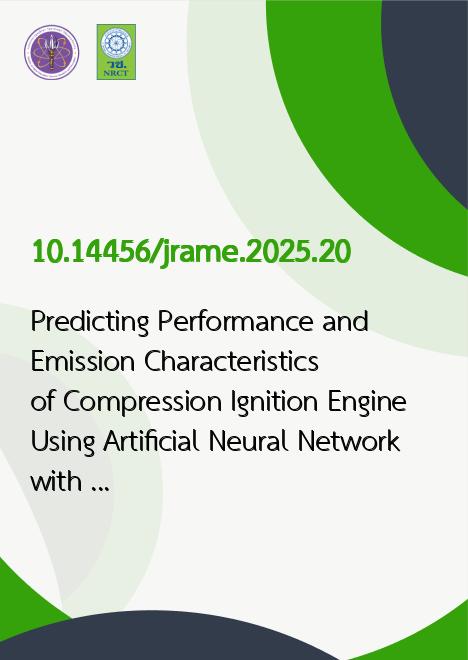
|
Predicting Performance and Emission Characteristics of Compression Ignition Engine Using Artificial Neural Network with Biodiesel Blends from Used Temple Oil |
|---|---|
| รหัสดีโอไอ | |
| Creator | 1. S. B. Anjappa 2. D. K. Ramesha 3. K. Ganesh 4. B. C. Channakeshava |
| Title | Predicting Performance and Emission Characteristics of Compression Ignition Engine Using Artificial Neural Network with Biodiesel Blends from Used Temple Oil |
| Publisher | Thai Society of Mechanical Engineers (TSME) |
| Publication Year | 2568 |
| Journal Title | Journal of Research and Applications in Mechanical Engineering (JRAME) |
| Journal Vol. | 13 |
| Journal No. | 2 |
| Page no. | JRAME-25-13-020 (p.1-17) |
| Keyword | ANN, Performance and emission characteristics, Machine learning, Temple oil, Biodiesel blends, Compression ignition engine |
| URL Website | https://ph01.tci-thaijo.org/index.php/jrame/index |
| Website title | Journal of Research and Applications in Mechanical Engineering (JRAME) |
| ISSN | 2229-2152 |
| Abstract | Power generation is highly dependent on compression ignition engines, which are mostly compression ignition engines with no power output that release dangerous toxic gases such as petrol and diesel, contaminating the atmosphere by disturbing local ecosystems and contributing to environmental problems. Efforts to solve this problem have focused on alternative fuels, and oil-based biodiesels are a popular choice owing to their sustainability and diesel-like performance. Towards this objective, the present study is focused on development of artificial neural network models for the performance and emission characteristics of biodiesel to reduce the physical testing which demand high resource inputs by making property based predictions more accurate. The brake specific fuel consumption (6–5–1), brake thermal efficiency (6-3-1) and exhaust gas temperature (6-5-1) are the best ANN model architectures for forecasting different performance metrics. The model obtained MSE of 0.0397, RMSE of 0.1993, MAD of 0.1234 and MAPE of 0.5599 for brake thermal efficiency prediction. According to the sensitivity analysis, the model for brake thermal efficiency and exhaust gas temperature is sensitive to fuel consumption. The ANN model for brake specific fuel consumption is significantly sensitive to torque, and the model for brake specific energy consumption is sensitive to breaking power, which provides credence to the wider use of a biodiesel as a practical substitute of fuel, especially for products made from used temple oil. This change may contribute to a greener future by lowering a greenhouse gas emission and promotes better energy practices. |
